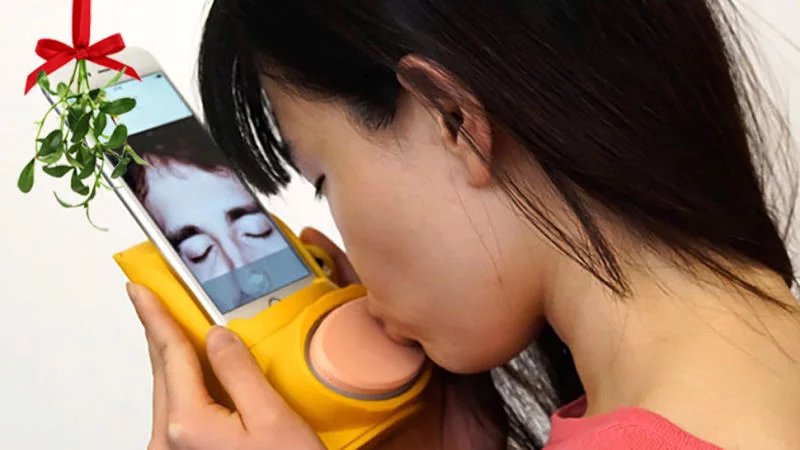

Holidays can be a rough time for those who are truly married to their jobs but also have a human that they love in their spare time. Enter the Kissenger, a new smartphone peripheral that allows anyone to send a smooch live via video chat.
Named after former Secretary of State Henry Kissinger* who rained bombs on millions of people from half a world away, the device is simple. It’s a little larger than a protective case and has an oval silicon “lip” at the bottom. High precision force sensors register a user’s lip movements and miniature linear actuators replicate those movements on the device of the person being kissed.

It’s easy to imagine that this could make lovers feel like kids again, always anticipating that moment of the kiss. An awkward conversation plays out about how the flight was, while their eyes drift towards that big, freshly sterilized silicone pad. Waiting, longing.
But, Kissenger is more than just a way to maintain intimacy. Emma Yann Zhang, the creator of the device, presented it at this week’s Love and Sex with Robots conference. She believes that humans will inevitably become more intimate with A.I. or robots and that the ability to share a kiss could be an important factor in that bond. She also makes it clear in a recent report that “this research will not attempt to conclude whether it is ethically acceptable to have intimate relationships with robots.”
As with any communication technology, the project is also about collecting data. Researchers will record statistics about blood pressure and heart rate in lab tests to see if users can be affected in the same way that they are by a real kiss. And eventually, Kissinger’s creators hope to pass the Turing test. Will lab subjects be able to tell the difference between a kiss from a person and a kiss from a computer simulation?
Kissinger is Zhang’s PhD project and she plans to continue with her research at the City University London lab of Adrian Cheok. We probably shouldn’t expect a product for consumers very soon.
*this project is not named after Henry Kissinger, its name is a combination of kiss and messenger.
Ref: gizmodo.com/robot-phone-device-transmits-kisses-to-your-loved-ones-1790482894
Holidays can be a rough time for those who are truly married to their jobs but also have a human that they love in their spare time. Enter the Kissenger, a new smartphone peripheral that allows anyone to send a smooch live via video chat.
Named after former Secretary of State Henry Kissinger* who rained bombs on millions of people from half a world away, the device is simple. It’s a little larger than a protective case and has an oval silicon “lip” at the bottom. High precision force sensors register a user’s lip movements and miniature linear actuators replicate those movements on the device of the person being kissed.
It’s easy to imagine that this could make lovers feel like kids again, always anticipating that moment of the kiss. An awkward conversation plays out about how the flight was, while their eyes drift towards that big, freshly sterilized silicone pad. Waiting, longing.
But, Kissenger is more than just a way to maintain intimacy. Emma Yann Zhang, the creator of the device, presented it at this week’s Love and Sex with Robots conference. She believes that humans will inevitably become more intimate with A.I. or robots and that the ability to share a kiss could be an important factor in that bond. She also makes it clear in a recent report that “this research will not attempt to conclude whether it is ethically acceptable to have intimate relationships with robots.”
As with any communication technology, the project is also about collecting data. Researchers will record statistics about blood pressure and heart rate in lab tests to see if users can be affected in the same way that they are by a real kiss. And eventually, Kissinger’s creators hope to pass the Turing test. Will lab subjects be able to tell the difference between a kiss from a person and a kiss from a computer simulation?
Kissinger is Zhang’s PhD project and she plans to continue with her research at the City University London lab of Adrian Cheok. We probably shouldn’t expect a product for consumers very soon.
*this project is not named after Henry Kissinger, its name is a combination of kiss and messenger
©1999-2026 eideas.co,.ltd. all rights reserved www.eideas.co.th